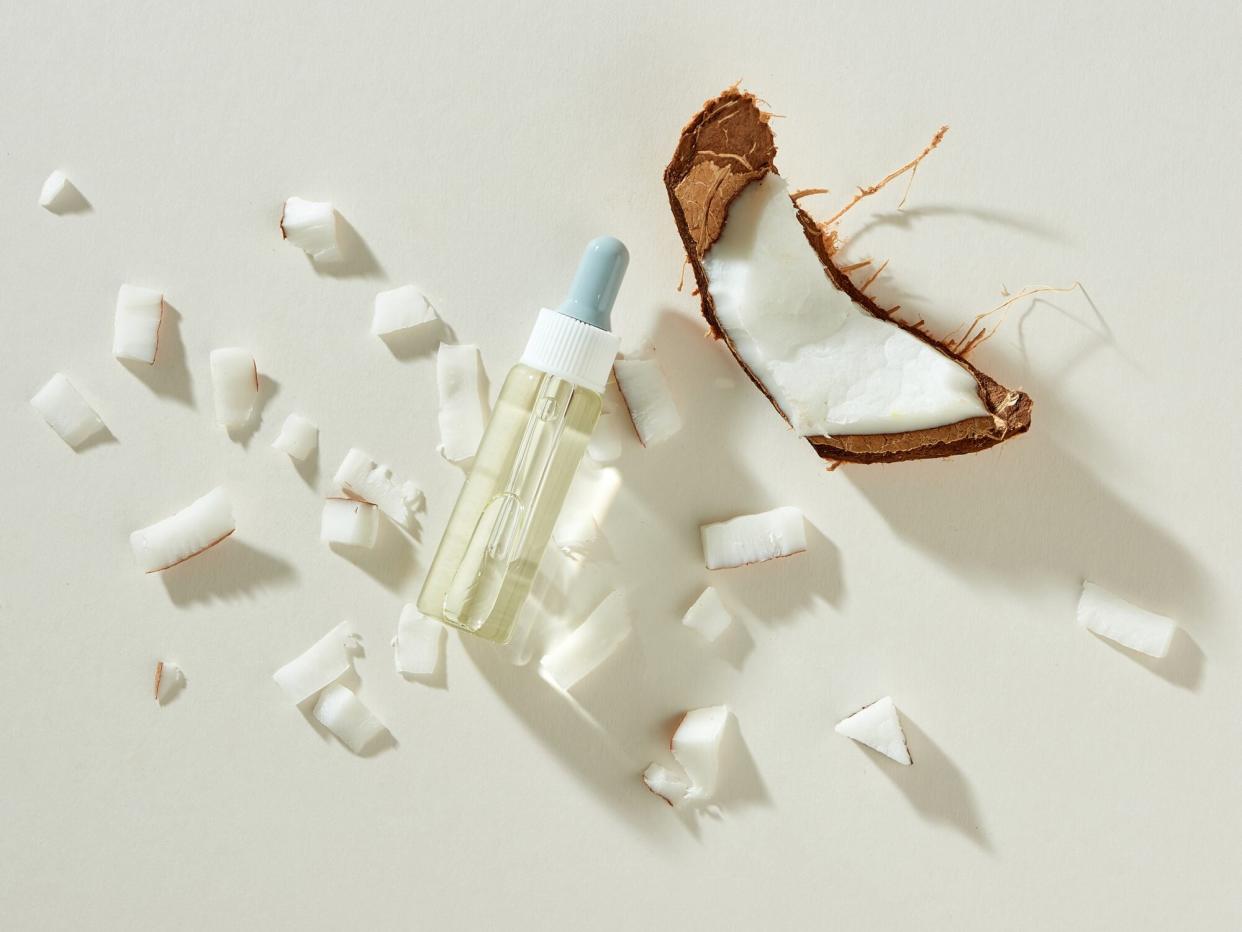People Swear by Oil Pulling for Cleaner Teeth—but Is It Actually Safe? We Asked Dentists

Maki Company Limited/Stocksy/Adobe Stock
It may be an ancient tradition, but oil pulling has gained traction in the holistic wellness world recently. This alternative oral care practice—which involves swishing and spitting oil, similar to mouthwash—is thought by many to improve oral and dental health. But does it actually work, and is it safe to do? Here, dentists help demystify the process and purported benefits of oil pulling.
First, what exactly is oil pulling?
Oil pulling, which is also known as "kavata" or "gundusha," first came into play more than 3,000 years ago. "The practice of oil pulling dates back to Indian and Ayurvedic traditional medicine," says dentist Sharon Huang, DDS, of Les Belles NYC.
In this ancient gargling process, people swish coconut, sunflower, or sesame oil between their teeth for a couple of minutes to help remove bacteria and debris while also keeping the mouth clean. "Coconut oil is typically the go-to choice for this," says Lilya Horowitz, DDS, of Domino Dental in Williamsburg, N.Y. After that, the oil is spit into the sink and rinsed away.
Is oil pulling safe?
With no known health risks of oil pulling, it's a generally safe practice. (Just be sure not to swallow the oil, which could upset your stomach.) "Oil pulling is absolutely safe, beneficial, and healthy," Dr. Huang says. "It's a great way to keep your teeth clean and white naturally, and also helps produce additional saliva, which helps keep bad breath at bay."
RELATED: 7 Common Teeth Whitening Mistakes to Avoid
Alex Rubinov, DDS, a dentist in New York City, explains that oil pulling works like liquid floss. "It's a wonderful way to create a more favorable microbiome in your mouth and make sure there's no harmful bacteria hiding in the crevices of your mouth and between your teeth," he says. "There are no known contraindications to incorporating oil pulling into your daily life, but you might feel a texture change in your mouth from the properties of coconut oil, although most people enjoy the smooth, gliding feel."
What are the top health benefits of oil pulling?
Studies show that oil pulling does indeed provide several potential health benefits. It can kill harmful bacteria in your mouth, get rid of bad breath, and even reduce inflammation. Most dentists recommend using an organic oil, and coconut oil is typically the best choice for its nutritional benefits. "Coconut oil contains vitamins A, D, E, and K, and has natural anti-bacterial and anti-fungal properties," Dr. Huang says. "It will help fight plaque and gingivitis."
However, oil pulling isn't officially recommended by the American Dental Association, so it's always important to exercise caution and keep up with regular dental cleanings—oil pulling shouldn't replace your other daily oral care practices. The latest research has found that oil pulling can be a safe and effective addition to a traditional dental routine, like daily flossing and brushing, to help maintain optimal oral health and hygiene.
RELATED: Is Water Flossing the Key to Whiter Teeth?
What's the right way to practice oil pulling?
If you're new to the practice, Dr. Rubinov suggests swishing one teaspoon of coconut oil in your mouth for five minutes daily. Eventually, you can try to work your way up to 20 minutes per day for maximum benefits.
"Try it as a weekend spa treatment for your mouth and see how you like it," he says. "It's definitely not for everyone, but it's often hard already to get people to floss daily and brush twice, so I would encourage anyone to give it a try and see if it's for them."
Are there any risks with oil pulling?
The most concerning risk comes from potentially swallowing the oil, however, this should only cause minimal side effects, if any. Since oils used for oil pulling are often used in cooking, they're edible and safe if accidentally swallowed while swishing. That said, for some, "it can cause upset stomach and diarrhea if swallowed, so start off with small quantities," Dr. Huang says. "And only increase once you're comfortable with the practice so you won't swallow the oil."
The bottom line? "If you are interested and have 20 minutes a day, there's no harm in trying this method, as long as you also make time for brushing and flossing," Dr. Horowitz says. If you have questions about whether you should give it a go, you can always consult your dentist for advice.
RELATED: 13 Advanced Oral Products That Will Change the Way You Brush Your Teeth

